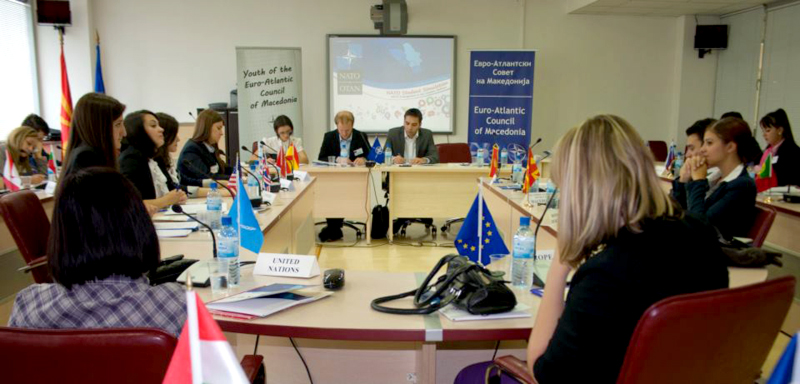NATO Summit Simulation in Tetovo
Students as Ministers
Written by: Jasna Pekić
{artsexylightbox}The Euro-Atlantic Council of Macedonia organised, on 1st October in Tetovo, a simulation of a NATO Summit. The participants of the summit had an opportunity to learn about the problems of the negotiation processes of Euro-Atlantic integrations and to understand the individual political positions of NATO member countries. On behalf of Atlantic Initiative, Jasna Pekic attended the simulation.
The idea of this project exists in the non-government sector in countries that want to become, or already are on the way to become a NATO member, and it is an ideal instrument for informing the youth and the general public about the issues of integrations and the work of the Alliance in general. A meeting of Ministers of Foreign Affairs on which the participants discuss expansion, open-doors policy, collective defence and other relevant security issues, is simulated during the summit.
Frustrating Experience
Over 40 students from Macedonia, with visitors from Denmark, Montenegro and Bosnia and Herzegovina took part in the simulated summit. The gathering was opened by an Ambassador of the Kingdom of the Netherlands in Macedonia, Maria Henriette Schurman, who is also a head of the contact-embassy for NATO in Macedonia. Praising such initiatives, Ambassador Schurman stated that she hopes that the diplomatic skills the youth participants acquire this way will bring useful results.
Each NATO member country had its “simulated representative”, and because the general topic of the summit was a debate on expansion, introduction speeches were held by the representatives from Bosnia and Herzegovina, Montenegro and Macedonia.
Each of these countries has great aspirations for NATO membership, but they face different challenges of the process of becoming a member.
Macedonia, who has been in MAP for 12 years already and who successfully got through the reform processes, still does not manage to solve the dispute with Greece about its name. The only NATO member that recognized Macedonia under its constitutive name is Turkey. However, until a consensus of all countries in NATO is reached, Macedonia will be denied fully-fledged membership. Two other countries share this frustrating experience of Macedonia.
Montenegro is facing reform processes with the goal of reaching NATO standards, but the problem is the weak support of the public (around 30%, according to the most recent polls) and internal divisions of the citizens about the Euro-Atlantic integrations. Maybe because of that, NATO member countries are sceptic of Montenegro’s true wishes to join the Alliance.
What about BiH?
Bosnia and Herzegovina is the most specific case. The topic of registering the perspective defence property is still proceeding, as one of the conditions for progress in MAP and NATO integrations. This simulated NATO summit showed that most people outside BiH (and surely many in our country as well) do not really understand what all this is about. The key question is why it would be a problem to register the assets that belong to the state army anyway.
Bosnia and Herzegovina did a lot to prove a genuine will to aquire NATO membership. Defence reforms in Bosnia and Herzegovina have been the most complicated and most controversial, and yet the quickest and most successful. On the other hand, there is progress with the registration of those defence assets. Some locations, more than a third, to be more precise, are already registered. Others do not have complete documentation, and that slows down the administrative procedure. Not all of these locations are perspective defence property, as many are non-functional for a long time now, and cannot be used for military purposes. The number of perspective locations is not 69, it is much lower, as was the conclusion of an inspection conducted by the representatives of Ministry of Defence of BiH and NATO HQ in Sarajevo.
The mentioned arguments should show NATO member countries the readiness of the Armed Forces of BiH and the government for MAP. But administrative troubles that are an obstacle to a quicker solution to this issue can leave an impression that BiH is not willing enough to truly devote itself to Euro-Atlantic integrations.
Fictive membership to Macedonia
During the simulated summit, after the presentation of the countries that want to become a NATO member, “Secretary-General” and “representatives” of the other 28 countries addressed the gathering. Student representatives of NATO member countries were required to learn everything about the country they were representing, its history of NATO engagement, but also the current foreign policy of the country they are representing, its attitude on expansion policy, especially the three aspiring countries.
Students are not informed enough about these things, and such an exercise gave them an opportunity to experience first hand the troubles of Euro-Atlantic integrations and the functioning of the process of decision-making inside the Alliance.
The simulated NATO summit was concluded by adoption of the Declaration on Stability, Expansion and Peacekeeping. Acknowledging the greatest progress, the Declaration fictively accepted the membership to NATO of Macedonia under the name FYRM, while Bosnian and Montenegrin progress will be re-evaluated on the next simulated summit in 2013.












